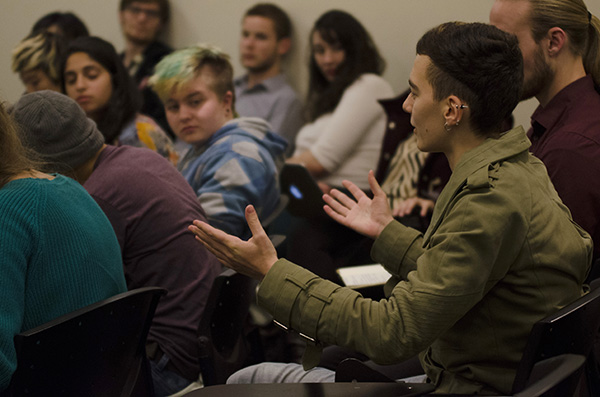
Members from the Students and Labor Action Movement, Faculty Against the Sexton Plan and International Socialist Organization came together to discuss and debate student debt, expansion, overseas campuses and student and faculty issues regarding the power of the administration.
The event was titled The Neoliberal University: Possibilities for Resistance. ISO member and Gallatin junior Jonah Walters said during the current neoliberal age, there is an increased competition between universities.
“I think often there’s this temptation to reduce the problems that we are confronted with bad administrators or misguided leadership,” Walters said. “What we are trying to do is identify this as actually part of a political climate in which universities are being expected to compete with one and other like corporations.”
The debate and discussion on Oct. 16 was the first time the three groups teamed up and tried to think of ideas on how to organize and expand their activist movements. The five panelists from SLAM, ISO and FASP spoke for 25 minutes regarding student debt, neoliberalization and NYU expansion.
Following the discussion, the speakers opened up the debate to the approximately 30 audience members. Audience members talked about their issues with NYU and ways to organize activism. Each participant was allowed to talk for three minutes.
Walters said the event enabled members of FASP, SLAM and ISO to organize with each other and other members of the NYU community.
“We realized early in the semester that there were a lot of students on campus that were invested in these issues and were doing really good work, but it wasn’t as connected as it should be,” Walters said. “An objective of this is to give everyone a platform to come and speak.”
A general consensus from the three activists groups was that they need to gather together and meet in the future to further activism at the campus.
“This is an ongoing conversation, we are not solving the issue tonight in this hour-long discussion,” Gallatin senior and SLAM member Caitlin Brimmer said.
Third-year GSAS doctoral student Sean Larson said success and failures from SLAM, FASP and ISO must be looked at to strategize how to successfully reach students and send their message to the university.
“Part of figuring out what people are radicalizing around would involve beyond getting the information out there, but also who is the information getting to and how is that information reaching students?” Larson said.
NYU spokesman John Beckman said the university has addressed these issues by increasing financial aid and analyzing the need to expand through the University Space Priorities Working Group.
“New academic space is needed, NYU has the financial capacity to create it, and we are making strides on increasing financial aid and reducing student debt at NYU,” Beckman said. “NYU has already significantly improved financial aid in the last 10 years – increasing the budget by over 130 percent, and growing the average grant so that it now covers 55 percent of tuition, up from 34 percent.”
He also pointed to the Momentum Campaign, the Finish Line Grant and the Global Pathways Scholarships as university strides to help financial aid and student debt.
Neela Qadir is a deputy news editor. Email her at [email protected].

























































































































































